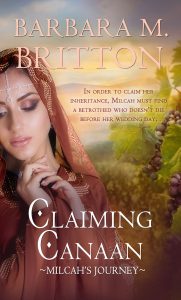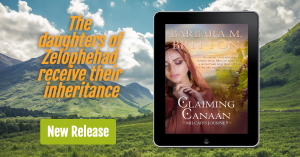I’m thrilled to welcome dear friend and fellow Pelican Book Group author, Barbara Britton, back to Romancing History today. The third book in Barb’s fabulous Daughters of Zelophehad series, Claiming Canaan, just released. Although I haven’t had a chance to read it yet, it is on my TBR pile and I’m anxiously awaiting the conclusion of this amazing series.
And, Barb has graciously offered to giveaway an Ebook copy of one of the books in the series, Winner’s Choice! Details to enter the Giveaway are below.
Saying Good-bye to Historic Girls
Guest post by Barbara Britton
Thank you for having me back on the blog, Kelly. I appreciate you faithfully reading my series on the daughters of Zelophehad.
The daughters of Zelophehad are five orphaned sisters who went to Moses and asked to inherit their deceased father’s land. Moses deferred to God, and God agreed with the girls. God said that if a man died without a son, his daughters could inherit his land (Numbers 27:1-11). The sisters’ “bold ask” was new to me a few years ago. Now, as the last book in the series releases, I am sad to say good-bye to Mahlah, Noah, Hoglah, Milcah, and Tirzah.
In “Claiming Canaan,” the girls receive their land. We know from Joshua 17:3-6 that the sisters approached Eleazar the priest, Joshua, and the leaders of Israel. The girls remind the powerful leaders of Israel about their historic inheritance. These girls had guts! But they also knew that it had been several years since God’s decree about their land, and at this point in time, Moses was long gone.
As an author, I had to decide what type of land the girls would receive. I placed them in the Jezreel Valley near Canaanite cities that were inhabited by idol worshipers. What would faith in action look like for these girls? I bestowed on Milcah, the protagonist in this final book, a (spoiler alert) vineyard. You could probably discern Milcah’s inheritance from the book cover. Would a vineyard be controversial?
I delved into Scripture and discovered that the “Proverbs 31 Woman” planted a vineyard (Proverbs 31:16-17). How had I missed this purchase? She also works vigorously which is something Milcah discovers comes hand in hand with owning a vineyard. Farming is not easy.
I placed the daughters of Zelophehad in the Jezreel Valley. The valley is lush and green. We see later on in Scripture in I Kings 21 that Naboth owns a vineyard in Jezreel. He does not sell his vineyard to King Ahab because it is part of God’s promised land. Tribal lands were important—a gift from God. God places restrictions on the daughters of Zelophehad and who they could marry in Numbers, chapter 36, so their land would not jump to the tribe of their husband. Land bestowed on the tribes needed to stay with that specific tribe. Naboth understands the importance of keeping his God-given land, but unfortunately it costs him his life. The sisters understand the importance of keeping their land within the tribe of Manasseh when they respond to their restrictions with faith.
Numbers 36:10 says, “So Zelophehad’s daughters did as the Lord commanded Moses.”
So, my series ends with girls staining their feet while stomping grapes and going forth with God into a land filled with hardship and unbelievers.
I hope the faith of Mahlah, Noah, Hoglah, Milcah, and Tirzah inspires us all.
Are these brave girls new to you?
About the Book
 When the tribal elders make marriage a requirement for claiming her land, Milcah bat Zelophehad must find a betrothed straightaway. The only problem in finding a husband is that all her suitors were slain while conquering the land of Canaan. Men avoid her in order to stay alive.
When the tribal elders make marriage a requirement for claiming her land, Milcah bat Zelophehad must find a betrothed straightaway. The only problem in finding a husband is that all her suitors were slain while conquering the land of Canaan. Men avoid her in order to stay alive.
After praying to God to send her a bold suitor, a man from her father’s clan plummets from a tree right on top of her. Is this God answering prayer, or a foolish antic by Eli, the war-scarred brother from one of her clan’s rival families?
Will settling in Canaan sort out Milcah’s troubles, or have her woes just begun?
Find the finale on Amazon, Barnes&Noble and where books are sold.
Excerpt from Claiming Canaan
Who is stealing grapes from Milcah and Eli?
Traveling toward the road, they carefully counted the lines of grape plants until they had reached the seventh row. Eli tapped his sword and motioned for her to give him a berth to draw his weapon. He unsheathed his blade. Muted light gleamed on the worn iron.
From grape plant to grape plant, they slipped closer to the thieves. The width of the plants and bush-like thickness of the grape leaves and clusters, blocked their bodies from view.
Her palms dampened as they neared the pickers. She wished she had drunk her fill before hurrying into the field, for her tongue could not find a drop of saliva. Was Eli as frightened? Or did year upon year of battles, prepare one for a fight?
Eli stilled.
Branches rustled on the next planting.
With the stealth of a predator, Eli shifted into the middle of the path.
Someone ducked from under the grape leaves, basket in hand. A boy. Not much older than Jonah. Ten years of age at most.
The young man did not flee, or attack, or give a defense. He stared. Dropping his basket, he leapt backward and tripped, felled by the girth of the basket brimming with grape clusters.
“Where did you run off to, Yarrat,” a woman’s voice asked in a harsh whisper.
Suddenly, crawling from underneath the tall stalks of the plant, a babe appeared. A girl with cheeks darkened by Milcah’s grapes. The girl’s face crumpled. She collapsed onto the path and whimpered. Her round-eyed gaze fixated on Eli’s sword.
These bandits were a family. Milcah’s heart hollowed at the sight of the little girl’s torn covering.
“Answer me, son.” The woman ducked from the next row, tossed her grapes at a half-filled basket, and shrieked. A spooked lark catapulted toward the night sky.
The little girl wailed. The boy remained prone on the ground, feigning a corpse.
“Do—do not harm my children.” The woman dropped to her knees. Her words and her clasped hands begged Eli to spare their lives.
Eli remained a sculpture of flesh.
“We mean you no harm.”
Milcah approached and stood by Eli’s side. “This vineyard was given to us by the One True God. It is an inheritance from my father.”
The boy scrambled to his feet. Hands fisted, he yelled, “You killed my father.”
Finally, the little thief had spoken.
About Barbara
 Barbara M. Britton lives in Southeast Wisconsin and loves the snow—when it accumulates under three inches. She is published in Biblical fiction and enjoys bringing little-known Bible characters to light in her stories. Look for Barb to venture into Christian Historical fiction in June with “Until June.” Barb is a member of the American Christian Fiction Writers, the Society of Children’s Book Writers and Illustrators, Romance Writers of America and Wisconsin Romance Writers of America. Barb has a nutrition degree from Baylor University but loves to dip healthy strawberries in chocolate. Find out more about Barb’s books on her website: www.barbarambritton.com.
Barbara M. Britton lives in Southeast Wisconsin and loves the snow—when it accumulates under three inches. She is published in Biblical fiction and enjoys bringing little-known Bible characters to light in her stories. Look for Barb to venture into Christian Historical fiction in June with “Until June.” Barb is a member of the American Christian Fiction Writers, the Society of Children’s Book Writers and Illustrators, Romance Writers of America and Wisconsin Romance Writers of America. Barb has a nutrition degree from Baylor University but loves to dip healthy strawberries in chocolate. Find out more about Barb’s books on her website: www.barbarambritton.com.
Barb is also on Twitter, Facebook and Goodreads.
Giveaway**
Barb is graciously giving away an Ecopy of one book in her Daughters of Zelophehad series (Lioness, Heavenly Lights, or Claiming Canaan) to one lucky Romancing History reader–winner’s choice. To enter, tell us which Biblical heroine inspires you the most!
**Giveaway ends at midnight on April 6, 2020.

